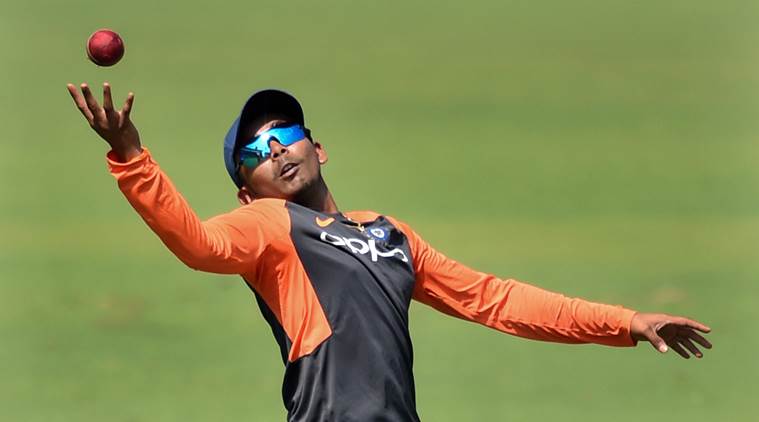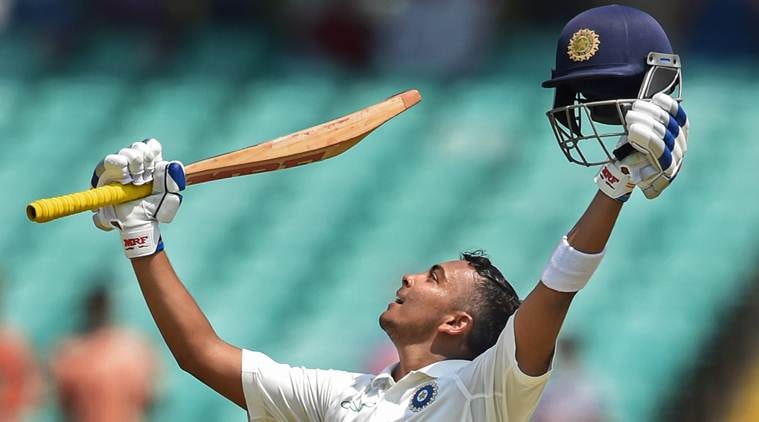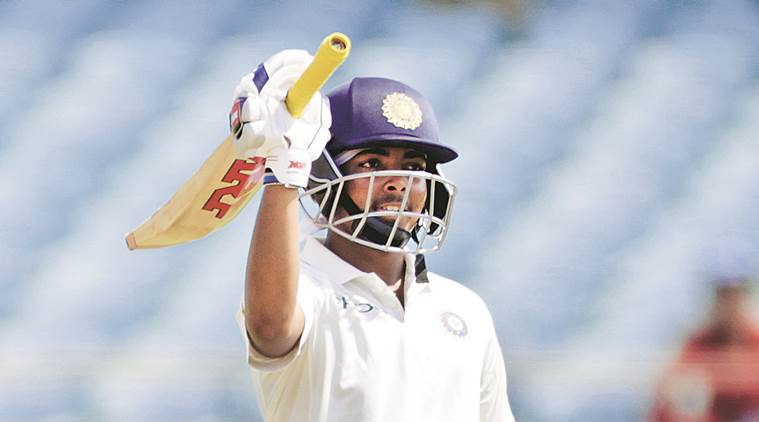Stay updated with the latest sports news across Cricket, Football, Chess, and more. Catch all the action with real-time live cricket score updates and in-depth coverage of ongoing matches.
Prithvi Shaw: Out in the cold for having cough syrup
Test opener Prithvi Shaw banned till Nov 15 after testing positive for terbutaline, a stimulant he ingested via over the counter medication.
 Prithvi Shaw has been banned for eight months, backdated from March 16 this year. (File Photo)
Prithvi Shaw has been banned for eight months, backdated from March 16 this year. (File Photo)
India Test opener Prithvi Shaw has been handed a doping ban till November 15 this year after he was found to have “inadvertently” ingested Terbutaline, a prohibited drug on the World Anti-Doping Agency (WADA) list. Terbutaline is commonly found in cough syrups.
Shaw wasn’t included in the Indian team for the upcoming two-Test series in West Indies for doping violation, as the 19-year-old was provisionally suspended on July 16. The “hip injury” explanation given by chief selector MSK Prasad during the post-selection press conference on July 21 was basically a smokescreen.
Read | This has really shaken me: Prithvi Shaw on his doping ban
Shaw went to Australia last winter but was ruled out of the Test series with an ankle injury. By convention, an injured player returns to the squad once he is declared fit. Likewise, Wriddhiman Saha had been brought back to the fold. As far as Shaw was concerned, the BCCI ostensibly knew about his doping violation. He will now miss the three home Tests against South Africa in October and also the first Test against Bangladesh starting on November 14.
— Prithvi Shaw (@PrithviShaw) July 30, 2019
“On 16th July 2019, Mr. Shaw was charged with the commission of an Anti-Doping Rule Violation (ADRV) under the BCCI Anti-Doping Rules (ADR) Article 2.1 and provisionally suspended pending determination of the charge. Mr. Shaw responded to the charge by admitting the ADRV but asserting that it was inadvertent, being caused by his ingestion of the over the counter cough syrup he had taken for his cough,” stated a BCCI release issued on Tuesday.
 Prithvi Shaw has been suspended until November 15, 2019. (File Photo)
Prithvi Shaw has been suspended until November 15, 2019. (File Photo)
This is the second high-profile doping ban in Indian cricket in about 18-odd months. In January 2018, Yusuf Pathan had been handed a back-dated five-month suspension. In Shaw’s case also, the cricket board has opted for a back-dated eight-month ban that started on March 16 this year. His urine sample provided on February 22 during a Syed Mushtaq Ali Trophy match in Indore was found to contain Terbutaline.
Interestingly though, Shaw played 16 matches for Delhi Capitals in this year’s IPL, from March 23 to May 12. It means he was active as a cricketer during the period included in the back-dated ban. “The BCCI is satisfied with Mr. Shaw’s explanation that he had taken Terbutaline inadvertently to treat a Respiratory Tract Infection and not as a performance-enhancing drug. Having considered all of the evidence and taken expert external advice, the BCCI has accepted Mr. Shaw’s explanation of the cause of his ADRV, and on that basis has agreed that a period of ineligibility of eight months should apply, together with disqualification of certain results,” said the BCCI release.
 Shaw went to Australia last winter but was ruled out of the Test series with an ankle injury. (Source: PTI)
Shaw went to Australia last winter but was ruled out of the Test series with an ankle injury. (Source: PTI)
It added: “…because Mr. Shaw promptly admitted his ADRV upon being confronted with it by the BCCI, there is discretion under BCCI ADR Article 10.10.2 to back-date the start of the period of Ineligibility to the date of sample collection (22nd February 2019). However, the BCCI ADR Article 10.10.2 also requires Mr. Shaw to actually serve one half of the period of ineligibility. Therefore, further to BCCI ADR Article 10.10.2, the eight-month period of Ineligibility will be deemed to have started to run on 16th March 2019, so that it will end at midnight on 15th November 2019.”
Shaw can return to train with his club and/or his state team after September 15.
‘Big farce’
A senior BCCI official called Shaw’s IPL participation a “big farce”. “If his (Shaw) period of ineligibility is deemed to have started on March 16, the BCCI order puts a dent on the IPL, since Prithvi Shaw played the entire IPL during the period of ineligibility on account of a doping violation,” the official told The Indian Express.
 Interestingly though, Shaw played 16 matches for Delhi Capitals in this year’s IPL, from March 23 to May 12. It means he was active as a cricketer during the period included in the back-dated ban. (File Photo)
Interestingly though, Shaw played 16 matches for Delhi Capitals in this year’s IPL, from March 23 to May 12. It means he was active as a cricketer during the period included in the back-dated ban. (File Photo)
“Here is a player who represented India. He spent a couple of months at the NCA. And he is still going and buying over-the-counter cough syrup that has Terbutaline! So where is the anti-doping programme? Who is handling the anti-doping programme? Why can’t an India player speak to the concerned person and check whether that medicine was allowed or not? This is a complete failure of the anti-doping system,” he added, taking a jibe at the back-dated punishments.
Terbutaline, a banned stimulant 19-year-old Prithvi Shaw tested positive for, is a bronchodilator prescribed to patients who suffer from asthma or bronchitis. It can be consumed through inhalers, cough syrups, in capsules and injections. Terbutaline helps reduce the resistance in airways, which means it allows a user to breathe better and take in larger amounts of oxygen. In 2016 British cyclist Simon Yates received a four-month ban after testing positive for Terbutaline . While bronchodilators are proven to be helpful to increase the endurance of cyclists and marathon runners, its effectiveness in a sport like cricket is not significant, says Dr PSM Chandran, the president of the Indian Federation of Sports Medicine. “I don't know if it will really help a cricketer, especially a batsman who has to run across 22 yards. In marathons and cycling you have to take in more air, but in cricket it is very rare that a player is in such a situation or endurance is tested over long periods. So I don't find a situation where it would have helped Shaw on the field,” Chandra says. Stimulants like Terbutaline can be used to ease conditions like exercise induced bronchoconstriction too, where in a person finds it difficult to breathe or experiences asthma-like symptoms during or following a period of physical exercise. The issue of cyclists using stimulants to their possible advantage came to the fore when it was revealed that British great Bradley Wiggins applied for Therapeutic Use Exemptions successfully before big races in 2011, 2012 and 2013. Wiggins' admitted he used corticosteroid triamcinolone by applying for TUEs to treat allergies after hackers released medical files stolen from the World Anti-Doping Agency (Wada) database. Wiggins said that he had to use corticosteroid to treat pollen allergy. Incidentally when Prithvi Shaw was tested on February 22 this year on the sidelines of the Syed Mushtaq Ali Trophy, in the box provided in the form to declare any medication or supplement he had used over the past seven days, the cricketer wrote 'antibiotics'.
Two more offenders
Along with Shaw, Akshay Dullarwar of Vidarbha and Divya Gajraj of Rajasthan have been handed bans for doping violations. Dullarwar, who was charged by the commission on June 26, was found to have “inadvertently” ingested a metabolite of Deflazacort, Glucocorticoid, which is prohibited by the WADA. The Vidarbha U-23 cricketer provided his urine sample on March 10 in Hyderabad. The BCCI is “satisfied” with Dullarwar’s explanation that he had taken Deflazacort “inadvertently to treat an infection and not as a performance-enhancing drug”. His ongoing eight-month ban is for the period March 10 to November 9 this year.
As for Gajraj, an Under-19 cricketer, whose urine sample provided on February 5 in Jaipur, was found to contain the banned Acetazolamide, the back-dated six-month period of suspension would be from March 26 to September 25. Gajraj “inadvertently” had taken Acetazolamide “to treat an eye injury and not as a performance-enhancing drug”.































